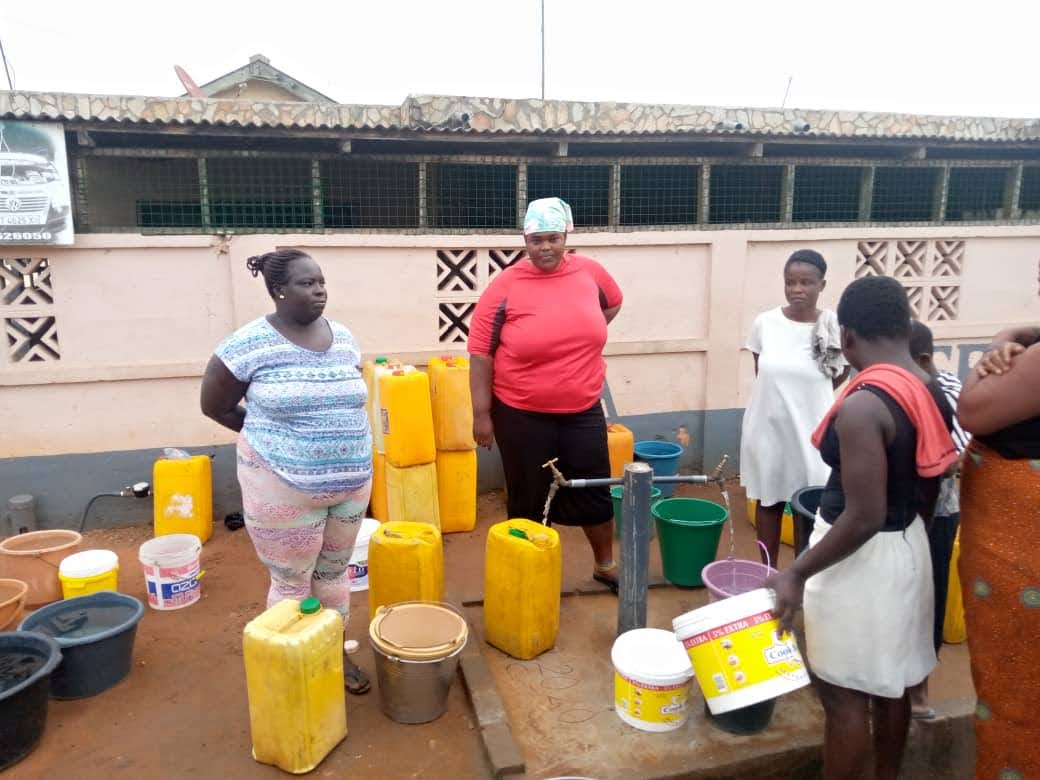Majority of the residents of Olebu in the Ga Central Municipality did not benefit from government’s Covid-19 free water mitigation package from April to June 2020. It is difficult to ascertain the actual cause of this deprivation as the community lies along the main Awoshie-Anyaa highway, meaning that poor road networks cannot be cited as an excuse.
Olebu has been a water-scarce community for far too long since the community only about 23km from the Weija Dam, the source of treated water for a greater part of Accra.
According to the Assembly Member for the area, Honorable George Adu Darko, only about 10 to 15% of the residents have access to piped water, which flows once a week for just a few hours and usually at night. This situation has compelled residents to rely on household vendors and water tanker operators for water supply.
In April 2020, the President of Ghana announced a three-month free water package for all Ghanaians to mitigate the impact of Covid-19 on the lives of the people. According to the Assembly Member, even though one section of the community received a water storage tank from the Municipal Assembly, it was filled only once with 3,000 litres of water for the entire period.
A greater majority of the residents claim they did not even hear about the storage tank somewhere in the community. They continued to buy water at the usual higher price than those connected to the Ghana Water Company Limited (GWCL) water distribution network. A 20-25 litre container known in Ghana as the ‘Kufuor gallon’ was and is still sold for 80 pesewas.
“During the period, some household vendors even sold rainwater at the same rate as treated water,” says the Assembly Member, who doubles as the Presiding Member for the Ga Central Municipal Assembly.
In a chat with some of the Water Tanker operators at Awoshie, who supply residents of Olebu with water, only a few of their members were engaged with the GWCL to distribute free water on contract bases. “The rest of us had to continue business as usual,” says a member of the operators. Since most of them were not consulted and engaged in the entire free water discourse, they continued to buy water from GWCL and sold to households at the normal rates.
Olebu was listed among communities in the Greater Accra Metropolitan Area (GAMA) for improved urban water supply under the GAMA Sanitation and Water Project. However, according to residents, several households have still not been connected to the piped water network, two years after registration with the project.
The Municipal Assembly’s attempt to resolve the Olebu water issue was the provision of two boreholes in the community in 2015. According to the Assembly Member, most of the residents do not patronize water from the borehole because it is salty and not suitable for drinking and washing of cloths.
“I am fed up with follow-ups with the Ghana Water Company on the same issue with water supply to Olebu,” said the disappointed Assembly Member.
Meanwhile, the situation was largely different at Gomoa Buduburam in the Central Region, where several households have direct connection to the GWCL main distribution lines. Here, the only challenge was that water flow generally stopped during the first few days into the free water period, according to residents. When water began to flow again, most of the people who usually buy water from household vendors had their free access to water from their regular vendors. According to some water vendors, however, free water was served only to their regular customers. Other people who wanted free water and were not regular customers were made to pay a token to compensate for the time and efforts to store and distribute free water. Some women interviewed around the Big Apple area, who usually buy from household water vendors, said their neighbours freely allowed them access to their taps during the period. Free water storage containers were also erected in parts of the community where the main pipes had not yet reached and were filled regularly. A landlord said even though he still received water bills, it was stated on the bills that the government has absorbed the total cost of water used.
In collaboration with the End Water Poverty Campaign, the Coalition of NGOs in Water and Sanitation (CONIWAS) is undertaking a project on Rights to Water for selected communities. The project aims to support communities without sustainable and adequate access to water to advocate for better Water services in their communities. Olebu is one of the communities identified for the advocacy support by CONIWAS after a journalist complained about the situation on a WhataApp platform.
By Emmanuel Addai

